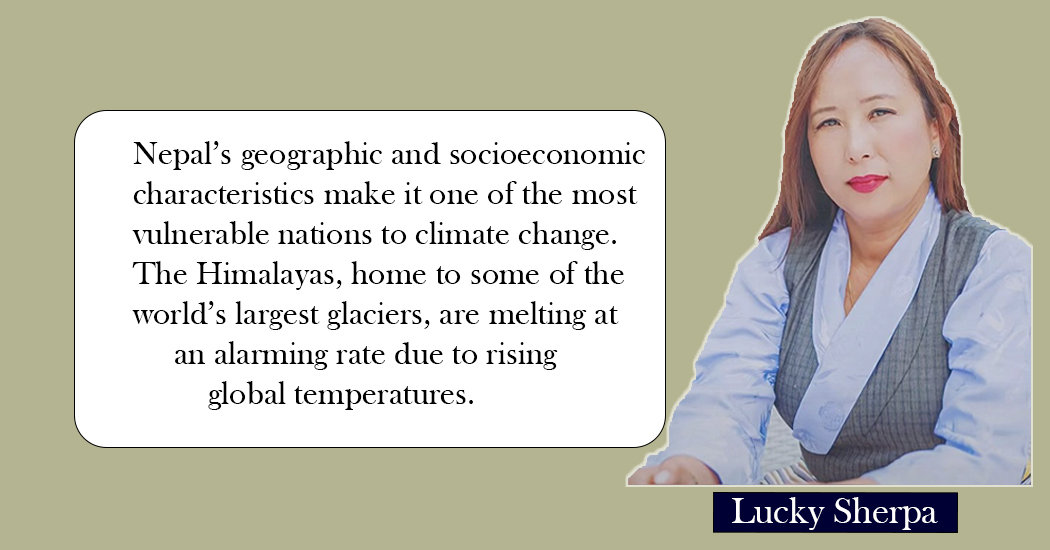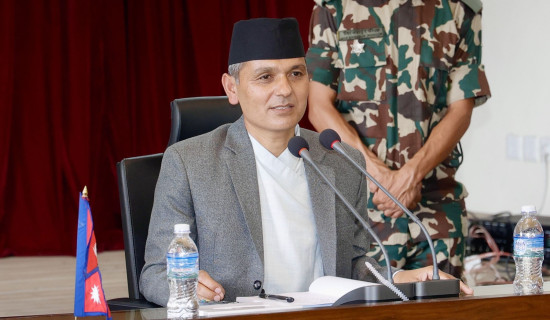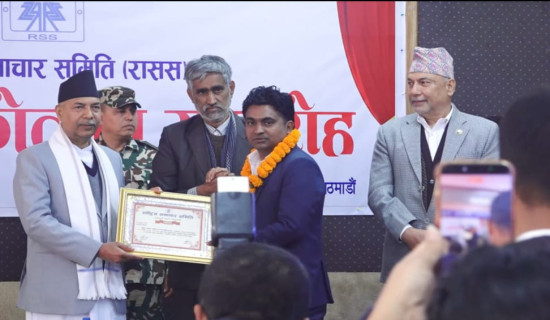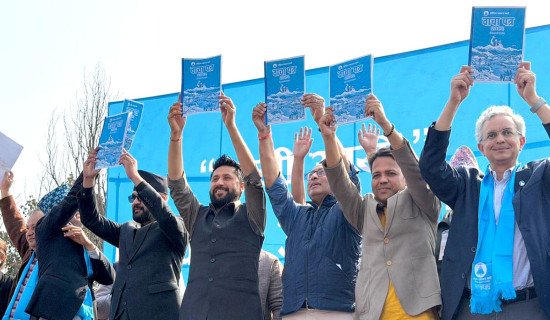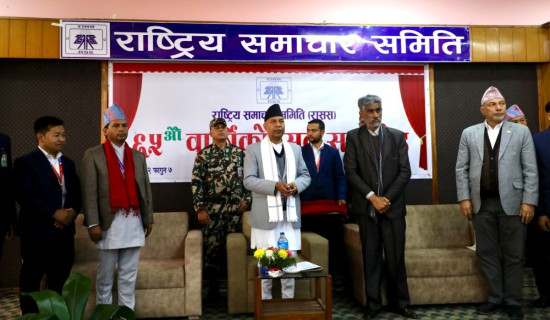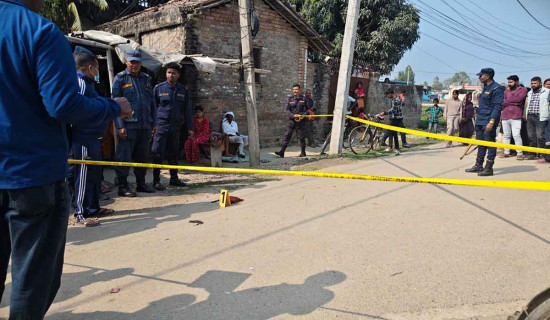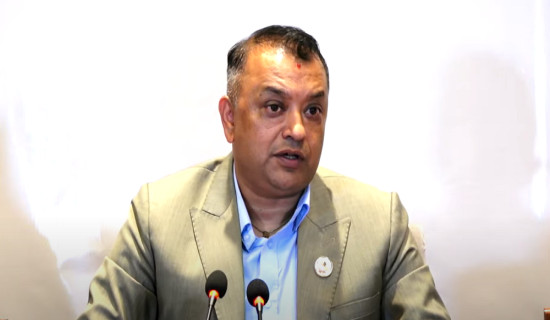- Friday, 20 February 2026
Climate Justice And Effective Global Action
The 29th conference of the parties to the United Nations Framework Convention on Climate Change (UNFCCC), held in Baku, Azerbaijan, has served as an important event on tackling the impacts of climate change. The climate summit known as COP29 was a major opportunity for Nepal to raise its voice for climate justice and action in view of fast melting Himalayas.
The delegation of Nepal, headed by President Ramchandra Paudel, conveyed a clear message that the most threatened nations require immediate assistance in order to effectively address the consequences of climate change. Being part of LDC countries, Nepal shared its development visions, vulnerabilities, past success, and current requirements while aiming at receiving international commitments that resonate with its adaptation, mitigation, and sustainable growth and development priorities.
Nepal’s vulnerabilities
Nepal’s geographic and socioeconomic characteristics make it one of the most vulnerable nations to climate change. The Himalayas, home to some of the world’s largest glaciers, are melting at an alarming rate due to rising global temperatures. Glacial lake outburst floods (GLOFs) pose severe threats to downstream communities, while erratic monsoons increasingly trigger floods and landslides that devastate infrastructure, agriculture, and livelihoods.
Climate change also impacts Nepal’s water resources, with reduced snow and ice affecting rivers and springs that millions depend on for drinking water and agriculture. The nation’s predominantly agrarian economy is under strain, with unpredictable weather patterns causing crop failures and food insecurity.
Despite being responsible for less than 0.1 per cent of global emissions, Nepal bears a disproportionate burden of climate impacts. This inequity underscores Nepal’s demand for climate justice at international forums like COP29. Nepal has been a vocal supporter of the Loss and Damage Fund, which was operationalised at COP28 to assist countries bearing the brunt of climate impacts.
At COP29, Nepal advocated for scaling up contributions to this fund and ensuring that it reaches the most affected communities quickly and effectively. The current $700 million pledged globally falls far short of the hundreds of billions required annually, according to estimates. Nepal emphasised the importance of accessible and predictable climate finance.
The New Collective Quantified Goal (NCQG), which is set to replace the unfulfilled $100 billion annual pledge by developed nations, is a key focus. Nepal called for transparent mechanisms to ensure that financial flows support both mitigation and adaptation efforts in vulnerable nations like itself. Nepal’s past successes in accessing Green Climate Fund (GCF) resources, including being the first country to secure GCF funding for a National Adaptation Plan, were highlighted. However, challenges in resource mobilisation and implementation persist, which Nepal urged the global community to address.
President Paudel reiterated Nepal’s demand for high-emission countries to take responsibility for their contributions to climate change. This includes compensating vulnerable nations for losses and supporting their transitions to sustainable development pathways. Nepal also sought greater international support for technology transfer and capacity-building initiatives. These are crucial for implementing climate-resilient infrastructure, renewable energy projects, and sustainable agriculture practices. Nepal shared its experiences with localised adaptation initiatives, such as the National Adaptation Programme of Action (NAPA) and the Local Adaptation Plan of Action (LAPA).
These frameworks have enabled community-driven responses to climate impacts, serving as a model for other nations. While Nepal’s participation at COP29 demonstrated its commitment to addressing climate change, several challenges remain.
Gaps in climate finance delivery: The unfulfilled $100 billion pledge by developed nations continues to undermine trust in international climate negotiations. Nepal, like many other vulnerable countries, struggles to access sufficient funds for its adaptation and mitigation projects. Implementation barriers: Despite progress in policy development, Nepal faces challenges in implementing climate strategies at the local level. Limited technical capacity, bureaucratic hurdles, and inadequate coordination among stakeholders often hinder effective action.
Geopolitical complexities: Global climate negotiations are often influenced by political and economic interests, which can dilute commitments to addressing the needs of vulnerable nations. For instance, debates over the responsibilities of developed and emerging economies remain contentious. Nepal has been an active participant in the LDCs Group, contributing to shaping the collective voice of the world’s poorest countries in climate negotiations. This role allows Nepal to advocate for shared priorities, such as increased financial and technical support. Regional initiatives, such as the South Asian Association for Regional Cooperation (SAARC), can complement global efforts. Nepal can work with neighbouring countries to address shared climate challenges, such as water resource management and disaster preparedness.
With immense hydropower potential, Nepal can position itself as a leader in renewable energy development. Expanding clean energy infrastructure not only reduces emissions but also enhances energy security and economic growth. Nepal’s long-term vision for combating climate change aligns with global goals, such as limiting temperature rise to 1.5°C and achieving net-zero emissions. However, achieving these objectives requires sustained international support and national commitment.
Nepal has updated its Nationally Determined Contributions (NDCs) under the Paris Agreement, with ambitious targets for renewable energy adoption, afforestation, and sustainable urban development. It has also integrated climate change into its Environment Protection Act and other legal frameworks. At COP29, Nepal underscored the urgency of turning pledges into action.
The country’s delegation called on global leaders to prioritise the needs of vulnerable nations in all aspects of climate negotiations, from finance to technology transfer.
Determination
Nepal’s participation in COP29 at Baku reflects its determination to secure climate justice for its people and future generations. By advocating for enhanced financial mechanisms, accountability from high-emission countries, and stronger global cooperation, Nepal is playing a crucial role in shaping the global climate agenda.
While challenges remain, the summit provides an opportunity for Nepal to strengthen its partnerships, share its experiences, and push for actionable outcomes that address its unique vulnerabilities. For a nation that embodies both the beauty and fragility of the Himalayas, the stakes could not be higher. Nepal’s voice at COP29 serves as a powerful reminder that the fight against climate change is a collective responsibility-- one that demands urgency, equity, and unwavering commitment from all nations.
(The author is Nepal's former Ambassador to Australia.)

